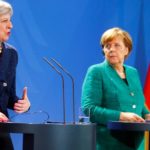
Editor’s Note: The Diplomatic Hub is a student society that aims to create an interdisciplinary forum for students interested in international affairs and diplomacy. Throughout the academic year, they organize events such as talks given by university researchers and various professionals working within the area of international affairs. The Diplomatic Hub also regularly comes out with new issues of their student-led journal on international affairs, The Diplomatic Post, which includes articles by students, staff and experts in the field. The latest edition of their journal, which came out earlier this month, is centred around conflict and contains four articles, from students and experts. The following article is the first one of the issue, written by Sir Sherard Cowper-Coles, former British ambassador to Afghanistan, Saudi Arabia and Israel. It is titled Managing Conflict: A Former Practitioner’s Perspective.
In January 1978, shortly after I joined HM Diplomatic Service straight from university, the Iranian Revolution broke out, with consequences still felt today across the Middle East and beyond. In the Foreign Office canteen, someone started a sweepstake on how long the Shah would last.
Sir Sherard Cowper-Coles, The diplomatic Post
When eventually he did go, in 1979, the Foreign Office commissioned a report, by a senior diplomat who had served in Teheran, on the reasons why the British Government had failed to see the overthrow of such an important ally, whose country had become a major market for British civil and military exports. The report concluded, in a typically self-serving fashion, that there had been a failure of information and intelligence. That there had been too many tractor and tank salesmen, and too few diplomats and intelligence officers, in the British Embassy in Teheran. We should redress the balance, urgently.
The outgoing British Ambassador, Sir Anthony Parsons, dismissed this conclusion. He pointed out that anyone who knew anything about Mohammad Reza Shah Pahlavi’s rule knew just how fragile his regime was. The bazaars of South Teheran had been seething with discontent. Only the repression delivered by His Imperial Majesty’s secret police, the Savak, had kept him in power. The problem, Sir Anthony said, in words I shall never forget, had not been a failure of information or intelligence, but a failure of imagination. We just could not imagine Iran without the Shah.
Tony Parsons’s wise words have never left me, as over three decades in the Diplomatic Service, and a further ten years working on geopolitics for HSBC, I have seen repeated failures to foresee abrupt and often violent upheavals in the course of human history.
Time and again we have been taken by surprise by seismic shifts in geopolitics. The assassination of President Sadat of Egypt, in October 1981; the stroke which disabled an Israeli Prime Minister, Ariel Sharon, willing and able to deliver peace with the Palestinians, in January 2006; the 9/11 attacks of 2001; Hamas’s brutal assault on Israel, on 7 October last year. Brexit, and then Trump, in 2016. The list of events which were not foreseen, and in most cases probably not foreseeable, by even the best-informed observers is endless.
In the last few days, I have been listening once again to Professor Sir Christopher Clark’s masterly analysis of the origins of the First World War, “The Sleepwalkers“, in which he chronicles the chapters of accidents and misjudgements that led to one of the most destructive wars in human history. Time again Tony Parsons’s words ran through my mind: these were failures of imagination, not of information. The Emperors and Kings, Presidents, and Prime Ministers of the Great Powers who plunged the world into war were all intimately connected with each other: they just could not – would not – imagine war engulfing the whole continent.
More than two thousand years earlier, Thucydides wrote his history of the thirty-year war between the Athenians and their allies, and the Spartans and their allies. He wanted, he said in the preface to his “Peloponnesian War“, to record the mistakes that men had made, in the hope that those who read his history would not repeat them. He wanted his book to be a “ktema es aei“, a possession for all time. But then, he added disarmingly, he knew that human nature never changed. Men would read his book, nod wisely, and go on to make the same mistakes again and again.
None of this means we shouldn’t study the history of conflict, and the means of preventing and ending it. Nor should any of this should allow us to forget the horrors of all armed conflict, and the fact – seldom acknowledged by the antagonists – that in general, neither side has a monopoly of right.
And so, in striving to understand conflict, to stop it happening, and to resolve by forging with all parties a peace that lasts, we need learn no new lessons. We need to immerse ourselves in the political history and, at least as important, geography of all the parties to the conflict, to try to see from where they are coming and where they are heading, and to identify the common ground which must be the foundation of all conflict resolution.
Two other lessons. First, and more important, armed force may be necessary, but is never enough. It can only – should only – be part of a wider strategy, led by politics, but with plenty economics and a social dimension too. Second, statesmen and those who advise them should always and everywhere distinguish between strategy and tactics, remembering Sun Tzu’s dictum that strategy without tactics is the slowest road to victory, tactics without strategy merely the noise before defeat.
The spectacularly unsuccessful invasions after 9/11 by an angry and emotional United States, aided and abetted by a United Kingdom that should have known better, of not one but two Muslim countries are textbook examples of how not to conduct, let alone resolve, conflict. In both Iraq and Afghanistan, the American Republic failed to devise, still less deliver, a political strategy worthy of the name. Both campaigns were directed by soldiers out of their depth in every sense. As with an earlier first-term Senator who became American President and allowed his country to descend into a war which elementary knowledge of history and geography, and common sense, suggested could not be won, so President Obama continued two unwinnable wars based on military advice that was utterly unsupported by the realities in Mesopotamia or the mountains of Afghanistan.
Perhaps the only conclusion lies close to the deeper purpose of a university. In studying conflict, as in studying any other aspect of the world in which we live, we should never take anything for granted.
If you wish to read the Diplomatic Post‘s full issue, you’ll find it under the following link: https://www.exeter-diplomatichub.com/winter-2024
Image: The Diplomatic Hub



Average Rating